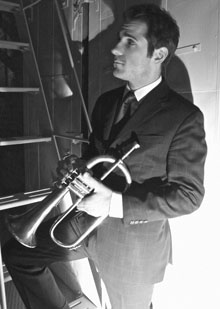
ADORATION OF THE MELODY Farinacci draws his inspiration from opera singers as well as from jazz vocalists. |
When I ask the 28-year-old jazz trumpeter Dominick Farinacci what's the best thing he's heard recently, he pauses for a moment. Maybe it was that performance of Tosca at the Met? . . . But no, wait a minute, "Last night I saw one of the greatest concerts of my life" — the Cleveland Orchestra at Avery Fisher Hall in Lincoln Center, under the direction of Franz Welser-Möst, playing Anton Bruckner's Fifth Symphony. "It was one of the most inspiring, invigorating performances I've ever seen. I was sitting in the audience thinking, 'I'm so proud to be from Cleveland!' "That, in a nutshell, is Farinacci — musical omnivore, Cleveland homeboy.
Well, okay, there's a bit more to him than that. But two things keep cycling back in our short phone conversation — his attraction to "beautiful, lyrical melodies in all kinds of music" and Cleveland pride. Farinacci releases the new, romantically-themed Dawn of Goodbye (E1) on July 26 and comes to the Regattabar on August 3.
He got an early start. Wynton Marsalis heard Farinacci when he was a 17-year-old high school student and picked him to play in a televised Live from Lincoln Center broadcast. Then it was on to Juilliard and a handful of discs on a Japanese label before Koch released Lovers, Tales & Dances in 2009 with an all-star cast that included fellow Clevelander Joe Lovano, pianist Kenny Barron, and vibist Joe Lock, who also provided arrangements. The new CD is built around his working band of the last few years: pianist Dan Kaufman, bassist Yasushi Nakamura, and drummer Carmen Intorre (they'll be at the R-Bar with new drummer Lawrence Leathers, in for Intorre).
On those two recent discs, you can hear some of what Marsalis must have heard — great chops and the ability to improvise spans of melody that develop with internal logic. What's also evident on the recent albums is Farinacci's secure tone, darkly colored and especially effective in the lower registers or when he switches off to flugelhorn. That "adoration of the melody," as the late Ruby Braff used to call it, is also evident. On the standard "You Don't Know What Love Is," Farinacci has the patience and focus to give us a beautiful reading of the melody — enhancing his dynamics with a judicious use of vibrato — and let Kaufman take the first improvisation before coming in with his own elaborations. On Lovers, he plays, "E lucevan le stelle," the last-act tenor aria from Tosca, fairly straight, the undulating rhythms in the orchestral accompaniment the only major variation from the score.
"I love how the great vocalists build the momentum to a peak," says Farinacci. "The climax of these arias. It takes your breath away. I can't imagine having an improvisatory section on that because the melody is so beautiful and so pure."
Farinacci approaches standards as a singer would, by learning the lyrics. "If we're going to attempt to play these songs, we have a responsibility of understanding what they mean in the context of who they were written by, and when they were written."